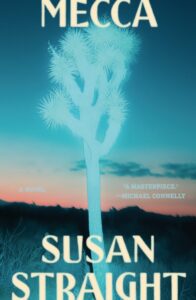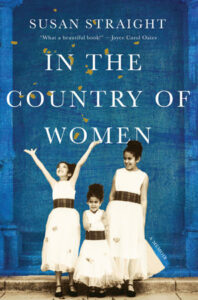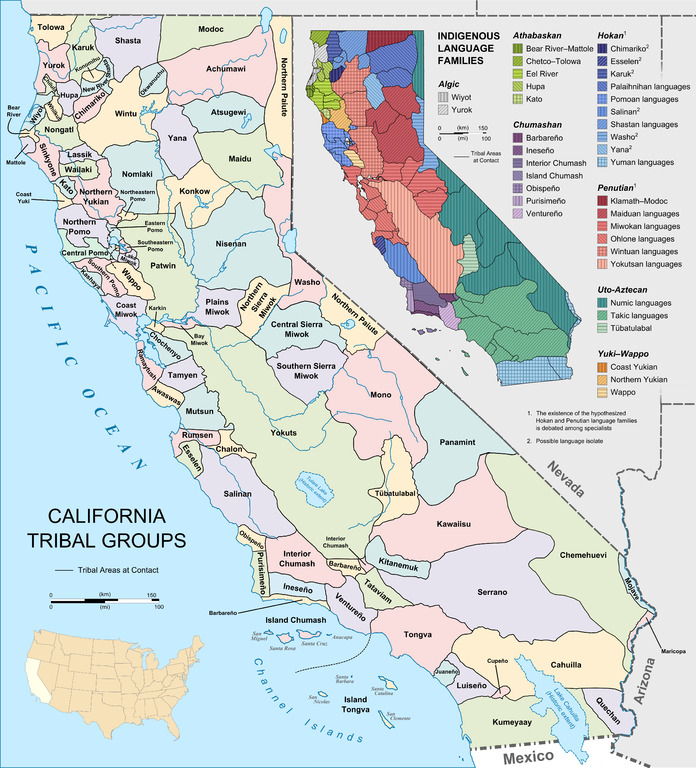
The dark underbelly of the “The Golden State” (Riverside, Southern California; present and past): “Valencias or oranges?” Only a citrus fruit-picker, or a writer was asks what seems like a simple question knows it’s loaded with history.
Perhaps only a writer like award-winning Susan Straight, Distinguished Professor of Creative Writing at UC-Riverside, born in and still lives and works in Riverside, Southern California in the Coachella Valley south of San Bernardino, could write such a razor-sharp novel (her ninth), Mecca that beams a spotlight on the “invisible people,” marginalized multiracial and multiethnic people of color, whose centuries-old history reflects America’s agricultural economic engine more than any other state. Only someone who cares deeply about this richly diverse part of the country, also more than any other state, could write this hard-hitting novel about people who’ve largely been ignored others “wanted us to forget.” Straight doesn’t. “The future always looks good in the golden land, because no one remembers the past,” Straight wrote in her 2019 memoir, In the Country of Women.

Mecca is not, though, just about one place in America. Its targeted themes are universal: racism, hatred, violence, abuse, victimization, and oppression – economic, social, and cultural. Along with highlighting the critical importance of history, family, community, and connectedness.
Like the heat blazing in this mostly desert terrain, temperatures soaring 120 degrees for days, Straight’s characters “came from people who worked the fields” toiling, sweating. Mecca is aflame. Hot, angry, fierce like the Santa Anna winds that roar mightily across the desert and the Salton Sea, a toxic brew.
Much like Straight’s academic title that speaks to the scholarly esteem she holds, Mecca, deserves to be held in high esteem literary-wise. That doesn’t mean all the prose is enchanted. To be utterly authentic, many marginalized characters spew embitterment, resentful of their uphill plight in life, haunted and burdened by the racist treatment of their ancestors. Their words not nearly as cringe-worthy as the white contemptuous characters, who utter words that are loathsome, debasing, intensified by MAGA attitudes. An ambitious novel spanning time.
The darkness is starkly contrasted against the beauty of the landscape, its mountains, valleys, and canyons. Hope among the ruins.
The dedication stirs:
“Truly this book is in memory of my brother, Jeff. When confronted with hatred or violence, he used to say: I don’t get that station, man. His inner radio was all about oranges, dogs, and trucks. We always made up life on our own.”
“Inner radio.” What a gorgeous way to think about the voices of people who are not spouting this ugly stuff. Suffused in some of the characters’ rage and despair are do-gooders and elders who hang onto to a more spiritual place. Mecca is a real town, but it’s also a word that conveys a religious pilgrimage seeking awakening and peace.
The protagonist is a do-gooder of the highest sort: Johnny Frigas, a late thirties policeman with the California Highway Patrol. If only the worst racial slur he encounters is Fritos. Made more disturbing since he risks his life policing the congested highways and cliffhanging roads and his dignity every time he pulls over a white driver full of road rage and racial animus.
Johnny calls himself a “moreno,” referring to the dark color of his skin, his Mexican and Native American heritage. His grandmother was from one of the indigenous peoples in California, the Cahuilla Indians from the Torres Martinez reservation in Thermal. California is also the state with the greatest number of indigenous tribes, none likely familiar. Johnny and his father still believe they’re one of the “lucky” ones, still living in a row of “little wooden houses” that are more like “shacks” in the Anza hills on a ranch, where he was once an orange picker too (and cattle driver), while others like them live in worse conditions in migrant camps and trailers.

The author wants us to know that the earliest settlers to SoCal were these indigenous tribes and Mexicans, though not treated as if they belong. Mexican Americans first arrived when Mexico lost a significant portion of its land to the US during the Mexican-American war of 1946-1948. Hardships and sacrifices also toughened and strengthened.
Even when one of the characters is irate, she reminds herself: “It had to be one of the most beautiful places in the world. A gorgeous series of layers and colors – the base of golden sand and white dunes, the silver and green ghost trees and smoke trees floating like strange baby’s breath, the spears of white yucca, and the green creosote bushes.”
Mecca, then, is character-driven. In some ways, it reads like a novel in stories. Stories that may take a while, given the novel runs 370 pages, to recognize they’re tied to one another. Connected to three main characters: Johnny, Ximena, and Matelasse. Once you realize the stories of other characters and their big, extended families are related, the reading and messaging becomes clear.
The diversity of Mecca characters reflects Susan Straight’s diverse family. She too connected, so strongly it’s hard to imagine anyone else writing it as vividly, honestly, brutally, and passionately.
Next up is Ximena. She also has a job no one wants: cleaning up after rich, white women who elect to have facial surgery at a fancy medical “spa,” where they toss around their unpleasant messes and leave something behind that has long-term consequences for her, like Johnny’s newbie days fresh out of the police academy also stumbling upon something that changed his life. We meet up with her again, different job but no less subservient. Fidelia, often by her side, is one of her cousins, struggling too, she bringing out an immigrant’s determination to learn English while speaking Spanish and Mixtec, a language of the “Middle American Indian from northern Mexico to Nicaragua.”
Johnny and Matelasse are single for different reasons. He from a traumatic incident introduced early on that unfolds so we see its impact. Unlike his tight group of friends, all married, some with children, whose stories are also told. Matelasse, part French as her grandmother was a slave in Louisiana, her mother still picking oranges, is a single mother left to count the plastic baggies for the lunches of her boys while working as an ICU nurse when we meet her.
These characters often come to us in chapters or bylines named for real towns, roads, and locations – Fuego Canyon, Bee Canyon, Coachella, Anza Crossing, Route 66 and Cajon Pass. As a literary technique, they serve to help us imagine Johnny riding his Harley on those highways and byways he knows so well, presumably like the author. They also contribute to the sense of connectedness rooted to a place and communities who do NOT turn their backs on each other.
The sizzling heat, not just in the vitriol and abuse, is thirst-wise, echoing the severe drought and climate change out West. Some stories cleverly bring out the need for ice to cool people down as well as ICE illegal immigrants are hiding from. ICE agents are so ferociously blinded in one story they dare to cross into a “sovereign nation.” Most, though, are characters born in America, citizens who deserve the same human rights but don’t get them.
In her memoir, Susan Straight tells us James Baldwin was her “teacher and mentor.” If only he could read the powerful ending, he’d be cheering along with us for those who refused to give in.
Lorraine